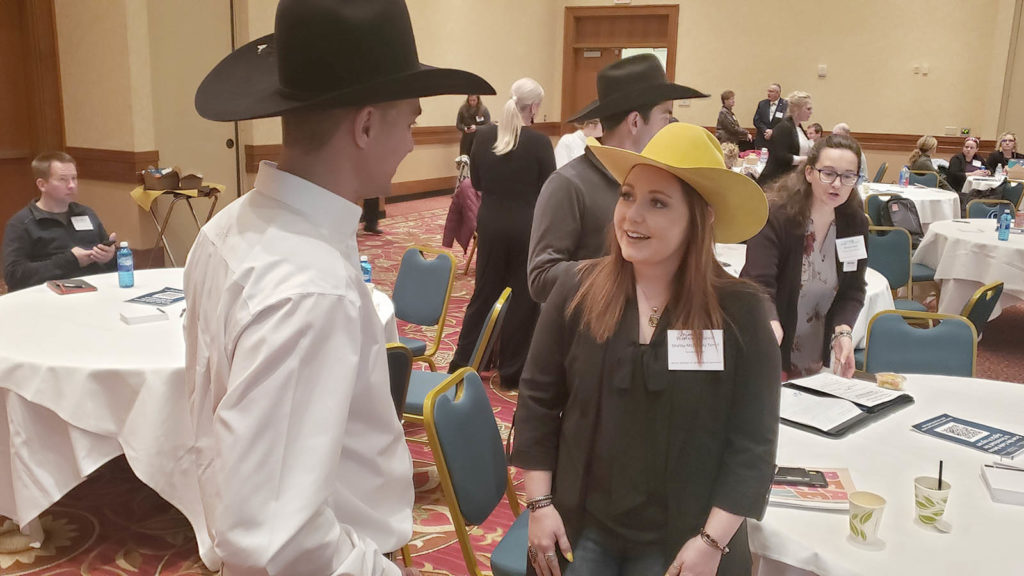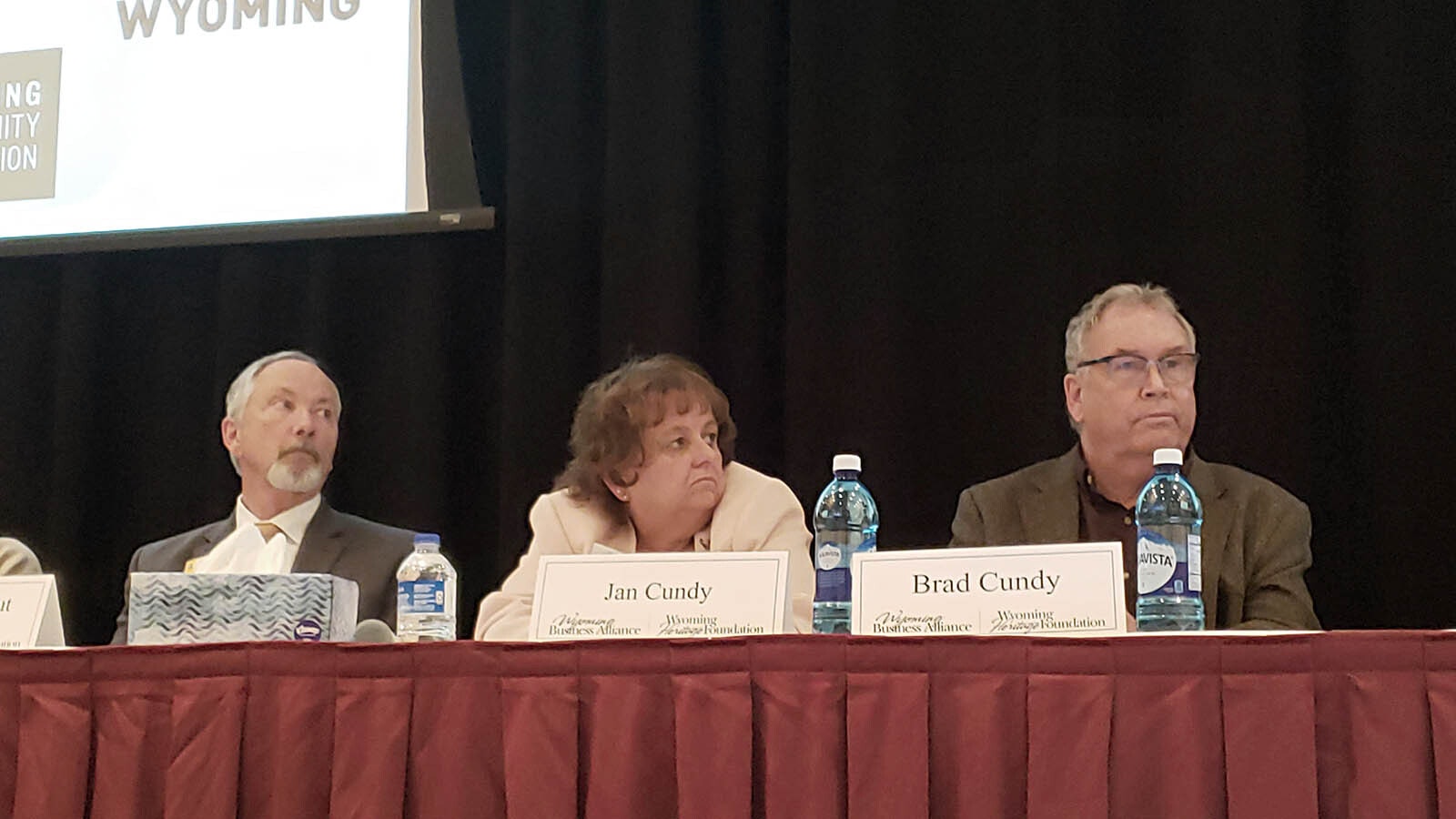By Renée Jean, Business and Tourism Reporter
renee@cowboystatedaily.com
Brad and Jan Cundy lost their son 11 years ago.
The parents are painfully aware that Wyoming is ranked No. 1 in the nation per capita for suicide. For them, that’s not just cold statistic. It’s an all-too-close-to-home reality tied to someone personal and dear, someone who they have forever lost.
A Growing Focus
The Cundy’s are part of a gathering momentum in Wyoming to boost mental health awareness and treatment, and help save the lives of Wyoming’s young people.
“I believe one of the most important things we can do is talk about it,” Jan Cundy said during the Wellness in the Workplace Symposium in Laramie this week.
The goal of the event was to bring business leaders together to talk about issues important in Wyoming and what can be done to improve mental health care across the state.
“Wyoming was No. 1 the year that Matt died,” Jan Cundy said about the Cowboy State leading the nation in suicide rate. “And 11 years later, we’re still No. 1. We’ve talked about it a lot, but we haven’t moved the needle nearly as much as the needle needs to be moved.”

Too High A Cost
The cost of not doing so are the lives of people like her son, who is forever 27, she said.
“We knew he was struggling,” Brad Cundy said. “We tried to get our arms wrapped around it. And as hard as we were trying in the six weeks leading up to that moment, it didn’t come together. There was a total lack of options to try to get him some help, and we failed. Out of that we had to be resilient.”
Part of that resilience has been talking about what happened, acknowledging what led up to it and helping others understand that change truly is needed.
“It’s a terrible loss to anybody who goes through it,” Brad Cundy said. “And you have to survive, and you have to try to keep it from happening to other people like yourself.
“You do that by talking about it, getting involved in schools and not being afraid to share that there’s an issue out there.”
Her Friend, Hero, Horse Whisperer and Dad
Shelby McCamey Terrill, of Texas, meanwhile, lost her father to depression.
“It started over 20 years ago when I lost that man,” she said. “My best friend, my hero, my horse whisperer, my dad. He lost his battle with depression and took his own life.”
She didn’t understand the world’s outlook on her father’s death at the time, or the shame over what he had done. She only began to understand more as she experienced her own battles with anxiety, depression, guilt and shame.

‘Suicide Is Real’
“Every 40 seconds, someone dies of suicide,” she said. “Depression is real, anxiety is real, suicide is real.”
The stigma needs to stop, she added.
“You wouldn’t tell a diabetic to just stop eating sugar, so don’t tell someone to just get happy,” she said. “It doesn’t work that way.”
Terrill has founded a nonprofit organization called Yellow Felt Soul and travels around the country talking about mental health and depression. Her yellow hat is a colorful symbol to help others understand what depression feels like.
“Yellow in the rodeo industry signifies bad luck,” she said. “You’re going to hit a barrel, you’re going to miss your steer, your calf, you’re not going to make 8 seconds in the rough stock, etc.”
Depression is a lot like wearing yellow, but not just in a rodeo, which ultimately ends so the riders can all go home.
“You feel like it’s 24/7, the world and everyone in it,” Terrill said.
Listen
Making a difference can be as simple as just listening, letting a person know someone cares.
“I have had multiple people reach out through my website, through social media, just wanting someone to listen,” Terrill said. “That’s all it takes sometimes for them not to take that next step.”
Ask directly about suicide, Terrill added, and listen without judgement.
“Show understanding and take their concerns seriously,” she said. “And the third (step) is to encourage them to seek help.”
‘They Don’t Want To Be Me’
State Rep. Art Washut, R-Casper, meanwhile, talked about losing a respected colleague last year, Lt. Daniel Dundas of the Casper Police Department.
“To their credit, both the police department and Danny’s family courageously stepped forward and acknowledged his cause of death,” Washut said. “And that allowed for the open conversation to occur.
“Far too often these cases occur, and they become whispers around the water cooler and conversations held in hushed tones. That’s not what we need with this issue.”
The death of such a well-respected police officer prompted Washut to recommend a budget amendment in 2021 that would provide support for a health and wellness conference, which happened in Casper this past summer.
Washut also met with Dundas’ widow to talk about some policy ideas.
“She told me how many dozens of phone calls she has received from spouses of officers and firefighters and others,” Washut said. “And she said in a very clear tone, ‘They don’t want to be me. They don’t want to be me.’ That just kind of hit me in the gut, and it really brought me to the table of being a policymaker.”
Become Policy-Shapers
Washut encourages business leaders to talk about the issues with lawmakers.
“We may be policymakers, but you could be policy-shapers by inviting us to see the world that you see,” he said. “To see the world that you experience every day in your workforce. That brings a level of awareness to your policymakers so that when we then meet in our official capacities, we have more than just empathy. We have some knowledge. We have some understanding that will guide our decisions.”
Unity, he added, also is important when making the case to lawmakers for change. Disagreement between factions of people who should be on the same side tends to cause lawmakers to hit the pause button. They can’t see a clear path forward.
“When we talk about suicide for a new mom, or suicide for a first responder, or suicide for an elderly person with cancer, the dynamics are going to be different, right?” Washut said. “They’re going to be different things, there will be different needs, perhaps different causes.
“But, wherever possible, the more unified the voice that’s calling for change or calling for funding, the greater the likelihood that you will see change, and that you will receive the funding.”





